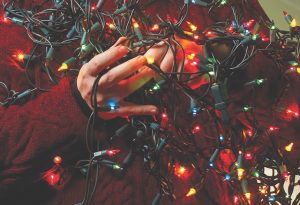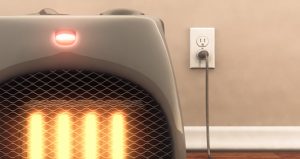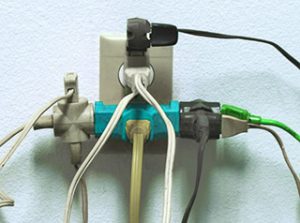Electrical Connection launches public safety campaign to reduce home electrical fires associated with colder weather

The improper use of space heaters, extension cords and holiday lighting combined with overtaxed circuits can increase the risk of electrical fire hazards over the winter months.
That’s why the Electrical Connection, a partnership of IBEW Local 1 and the St. Louis Chapter of the National Electrical Contractor Association (NECA), is launching a public safety campaign, which includes tips to reduce those hazards.
Between 2010 and 2014, about 45,000 home structure fires in the United States involved electrical failure or malfunction, according to a recent report from the National Fire Protection Association (NFPA). Those fires resulted in 420 deaths, 1,370 injuries and $1.4 billion in direct property damage each year.
“People tend to stay indoors more in the winter months and sometimes misuse electrical devices, such as space heaters, extension cords and holiday lights, creating a potential fire hazard in their homes,” said Frank Jacobs, IBEW Local 1 business manager. “We want to get ahead of that by launching a public safety campaign to keep people safe.”
LEADING CAUSES OF
ELECTRICAL HOME FIRES
The NFPA report found that electrical distribution or lighting equipment was involved in 57 percent of the home fires involving electrical failure or malfunction. Meanwhile, fires involving heating, ventilation and air conditioning equipment accounted for 19 percent, nine percent involved kitchen and cooking equipment and seven percent involved personal and household equipment.
“Our NECA contractors are frequently called to make electrical repairs to faulty installations that were performed by someone who didn’t have the skills to do the work,” said Doug Martin, St. Louis Chapter NECA CEO. “We emphasize building to National Electrical Code standards to avoid wiring hazards hidden behind walls of homes and businesses.”
ELECTRICAL CONNECTION
SAFETY TIPS
First and foremost, always make sure installations in your home or business conform to the standards of the National Electrical Code (NEC). This requires a fully licensed electrical contractor.

Secondly, while homeowners can visually inspect electrical systems, the Electrical Connection does not recommend they attempt to fix or tinker with them in any way. Leave that to a licensed professional.
Here are some other helpful tips:
• Space Heaters/Electric Blankets – Never use an extension cord for an electrical heating appliance, such as a space heater or an electric blanket. The cord provided with the heating device is properly rated and should be connected directly to the electrical outlet.
Inspect your space heater and discard it if it shows deterioration, particularly around the plug-in cord, or if it lacks a functioning automatic shut off if tipped over. Do not place space heaters near combustible materials, and keep children away from space heaters.
Closely inspect electric blankets and heating pads and discard them if you notice any potential fire hazard, such as discoloration due to overheating or exposed wiring.
• Extension Cords – Never use an extension cord for an extended time as a permanent or temporary wiring solution. Extension cords aren’t made to be used for long periods of time and can result in electrical fires. When you are using an extension cord, always make sure that the plug has all three prongs so the cord will stay properly grounded, which could prevent the cord from overloading. Any extension cords without the third prong should be discarded immediately.
• Holiday Lights – Examine and discard lights with frayed wires. They are not only a fire hazard, but a shock hazard and are especially dangerous if they come in contact with a metal gutter and ladder while being installed outside.
Use lights that are Underwriters Laboratories (UL) tested for safety and don’t exceed the strands of lights that can be connected as detailed on the product. Pay attention to whether the lights are rated for indoor or outdoor use.
Consider using LED lights which last 20 times longer and don’t burn hot like traditional incandescent lights. Child-proof all holiday decorations. Lights can be fascinating to young children, and if they get too curious, can expose them to a live circuit.

• Outlets – Don’t overload sockets with plugs that could start a fire. Any electrical outlets in your home that are near a water source – sinks, bathtubs, washing machines – require a ground fault circuit interrupter (GFCI) according to the National Electrical Code. A GFCI is a fast-acting circuit breaker that shuts down your electricity as quickly as 1/40 of second after a fault occurs.
• Wiring – Visually inspect your home’s service panel and note any potential concerns. Contact a licensed professional if the panel is not firmly attached to the wall or wires are not neatly enclosed within their protective box or if deterioration is noted. Also contact a licensed professional if you note wiring connection points are not capped with a wire connector and enclosed within an appropriate UL approved junction box.
The Electrical Connection has the largest data base of licensed electrical contractors in the St. Louis area. Visit electricalconnection.org to access the list.



Leave a Reply